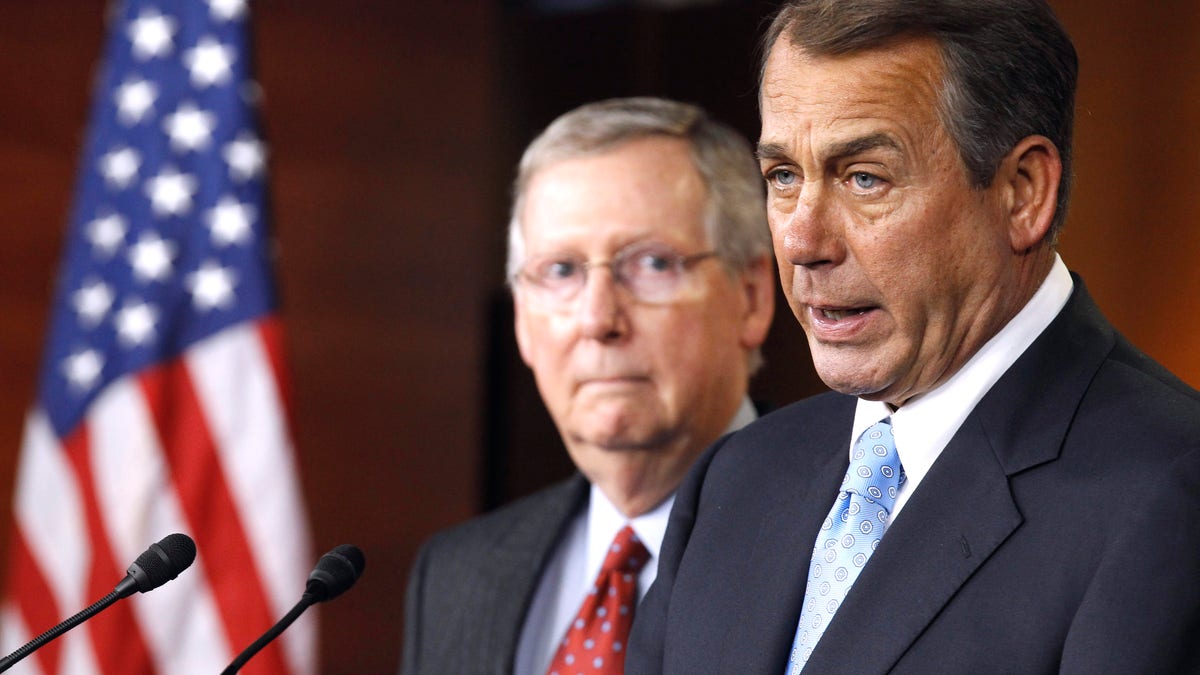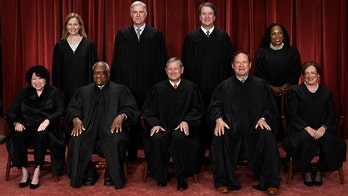
House Speaker John Boehner of Ohio, right, accompanied by Senate Minority Leader Mitch McConnell of Ky. speaks during a news conference on Capitol Hill in Washington, Wednesday, March 2, 2011. (AP) (AP2011)
As U.S. lawmakers seek a compromise on how much federal spending to cut in order to avoid a government shutdown, Tea Party activists who helped propel Republicans back into power are growing impatient with the debate.
When Republicans captured the House in November, vowing to slash $100 billion in federal spending from the budget year ending in September, 76 percent of Tea Party activists supported their deficit-reduction plan, according to a new Pew Research poll released last week.
But after House Republicans approved a plan last month to cut federal spending by $61 billion, that Tea Party support fell to 52 percent.
Now Tea Party Nation founder Judson Phillips, arguably the most vocal critic of GOP leaders, is pushing for a primary opponent against House Speaker John Boehner in 2012 for breaking his campaign pledge to cut $100 billion and for what he sees as hints that he's willing to cut less than $61 billion in a compromise with Senate Democrats.
"Charlie Sheen is now making more sense than John Boehner," Phillips wrote in his blog earlier this month.
In an interview with FoxNews.com Thursday, Phillips said he stands by his comments and goal of seeking a primary challenger to Boehner.
"Charlie Sheen still makes more sense than John Boehner because at least Charlie Sheen is winning," he said.
"This is the one message the Tea Party needs to be out there pushing," he said. "If you don't live up to your promise, we're going to throw you out."
Boehner's camp acknowledged the frustration among Tea Party supporters, but didn't accept responsibility for it.
"The speaker – and every Republican in the House – is frustrated by the pace of the debate, but the blame lies squarely with the Democrats who run Washington, D.C.," Boehner spokesman Michael Steel said in an e-mail to FoxNews.com.
"The House passed a bill that funds the government for the remainder of the year while cutting spending," he said. "It's the Democrats who are insisting on the status quo, and no one should be happy with the status quo."
Democrats controlling the White House and Senate have only two weeks to broker a deal with Republicans in charge of the House before the latest temporary spending bill keeping the government afloat expires April 8.
House Republicans have been digging their heels in on the $61 billion in cuts they approved last month but the Senate is not going along and Obama has threatened to veto it, making it unclear where they'll find compromise.
Levi Russell, a spokesman for the Tea Party Express, told FoxNews.com that the midterm elections in November may have set expectations too high.
"We forget the Tea Party is only influential over one third of the government," he said. "Tea Partiers are going to continue to be disappointed by what comes out of Washington until Republicans have control of the Senate and the White House."
The Tea Party Express has set its sights on defeating two Republican senators -- Olympia Snowe of Maine and Dick Lugar of Indiana— in 2012 primaries but is not targeting Boehner or other GOP leaders.
"We may not love everything that they do; we may wish they would be on the same page with us. But we know they got the message in 2010," he said.
Boehner's the "least of our worries," he added.
What has many Democrats worried is a fight over the federal debt limit, which they cannot increase without some GOP support in both the Senate and House. The administration has warned Congress that failing to raise the debt limit would lead to an unprecedented default on the national debt and derail the national economic recovery.
The Treasury Department estimates the government will hit the $14.3 trillion debt ceiling sometime between April 15 and May 31. But Senate Republican leader Mitch McConnell has warned that GOP senators would not vote to increase the federal debt limit unless Obama agreed to significant long-term budget savings that could include cost curbs for Social Security, Medicare and Medicaid.
Phillips said Republicans should reject any kind of compromise over the budget, even if it leads to a government shutdown or a default.
"What is worse: a government shutdown or an economic collapse," he said. "Is it worse to deal with a $14.3 trillion national debt or a national debt of $20 or $25 trillion and the whole thing collapses?"




